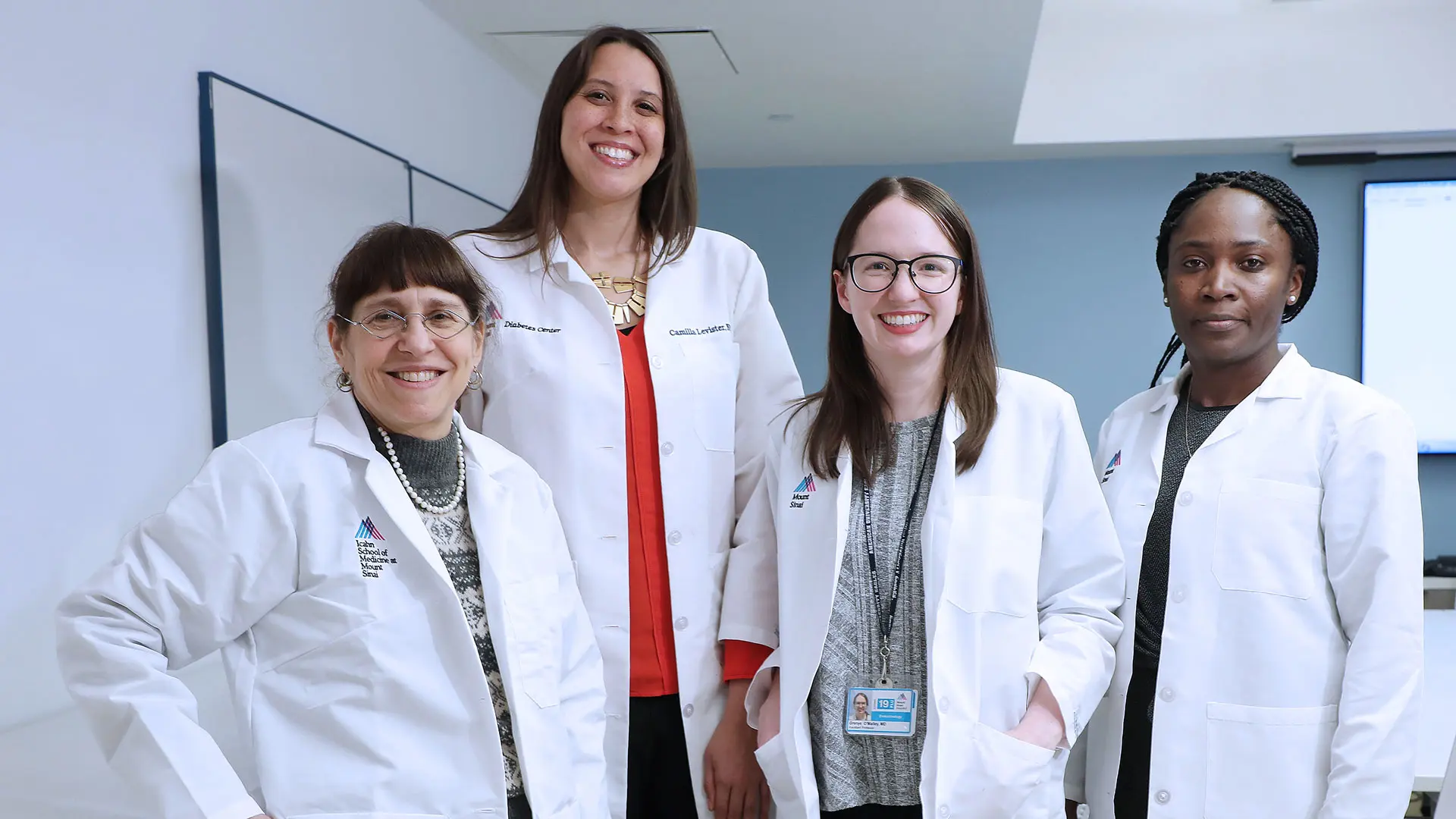An artificial pancreas system tailored to the specific challenges faced by pregnant women with type 1 diabetes is the goal of a study to be conducted by a consortium of four leading institutions, including the Icahn School of Medicine at Mount Sinai. The project, funded by the National Institutes of Health, is the first of its kind in the United States.
“Pregnant women with type 1 diabetes typically test their blood sugars seven to eight times per day, and many wear glucose sensors, but they still struggle tremendously to keep their blood sugar levels in target ranges,” says Carol J. Levy, MD, Clinical Director of the Mount Sinai Diabetes Center, and the project’s principal investigator at the Icahn School of Medicine.
If blood sugar levels are too low for a prolonged period of time, a pregnant woman can feel poorly, or pass out, and risk seizures. If levels rise too high, there are risks to her unborn child, including malformations, delayed lung maturity, placental malfunction, or fetal death. “The use of customized technology provides an important opportunity to improve patient and fetal outcomes,” says Dr. Levy, Associate Professor of Medicine (Endocrinology, Diabetes and Bone Disease). “We are excited to be part of the team evaluating this important area of research designed to improve care and reduce patient burden.”
The clinical trials are being conducted at three sites: Mount Sinai; the Mayo Clinic in Rochester, Minnesota; and the Sansum Diabetes Research Institute in Santa Barbara, California.
The overall principal investigator is Eyal Dassau, PhD, an expert on algorithm design and Director of the Biomedical Systems Engineering Research Group at Harvard University’s John A. Paulson School of Engineering and Applied Sciences.

From left: Carol J. Levy, MD; Camilla Levister, NP; Co-Investigator Grenye O’Malley, MD, Assistant Professor of Medicine (Endocrinology, Diabetes and Bone Disease); and Clinical Research Coordinator Selassie Ogyaadu, MD, MPH.
Each patient participating in the artificial pancreas portion of the study will wear a Dexcom G6 continuous glucose monitoring device and an insulin pump. Both devices are linked with a software algorithm on a smartphone, which identifies a personalized blood-glucose range and prompts doses of insulin with reduced input from the patient. This closed-loop system uses a customized algorithm to close the decision-making loop between the glucose reading and the delivery of insulin, with the goal of improving blood sugar control.
There are two artificial pancreas devices approved by the U.S. Food and Drug Administration but neither is designed to achieve the glucose targets needed for pregnancy. Pregnant women with type 1 diabetes aim for a narrower range—under 90 mg/dL while fasting and 130 to 140 mg/dL one hour after meals to achieve the best pregnancy outcomes for both the mother and baby.
“This is not easy to do, even for the most meticulous patients,” says Dr. Levy. Another challenge is that hormonal shifts in each trimester change the level of resistance to insulin, making the proper dose “a moving target.”
The first clinical trial in the grant—Longitudinal Observation of Insulin Requirements and Sensor Use in Pregnancy (LOIS-P)—has so far enrolled 30 pregnant women with type 1 diabetes and will follow their glycemic outcomes into the postpartum period, providing guidance in refining the algorithm. The trial is named for the late Lois Jovanovic, MD, who was a former director of the Sansum Institute and a role model for many in the study of diabetes, including Dr. Levy. The overall project is intended to progress from a sequence of in-clinic studies to a safe and effective, at-home clinical trial. Preliminary studies evaluating the first customized system for pregnancy are already underway.
“I view this work as critical for patients, and I have a personal perspective as well, since I have had type 1 diabetes for 49 years,” Dr. Levy says. “I managed my diabetes with my health care team through two pregnancies, and every day was a challenge. Caring clinicians are important, and any support that people with type 1 diabetes can have provides a huge difference. Every time I enroll a patient in the LOIS-P study or our studies of early system testing, I feel as if we are one step closer to a real answer for many women.”
Question of the Year:
The year of 2020 was filled with challenges due to COVID-19, both for people with diabetes and for the clinicians who care for them. It was known fairly early that people with diabetes who become infected with COVID-19 often become sicker than people without diabetes. As 2020 progressed, we learned more about the relationship between COVID-19 and diabetes, and it became clear, albeit not surprising, that good blood glucose control is associated with improved patient outcomes.
Both through clinical care virtually and our research studies during 2020, the benefits of technology to help patients and providers better manage glucose levels came to the forefront. We repeatedly saw the benefits of using technology, like continuous glucose monitors and artificial pancreas systems, to improve the quality of our patient care, reduce burden for patients and providers, and improve glucose outcomes. Patients frequently have told us that the technologies we have studied and are currently evaluating have provided marked benefits to their glucose control and sense of well-being. While we continue to work through these challenging times, our research continues to optimize the best
treatment options for people with diabetes.
- Carol J. Levy, MD
Featured

Carol J. Levy, MD
Director of the Mount Sinai Diabetes Center, and Acting Chief and Professor of Medicine (Endocrinology, Diabetes and Bone Disease)